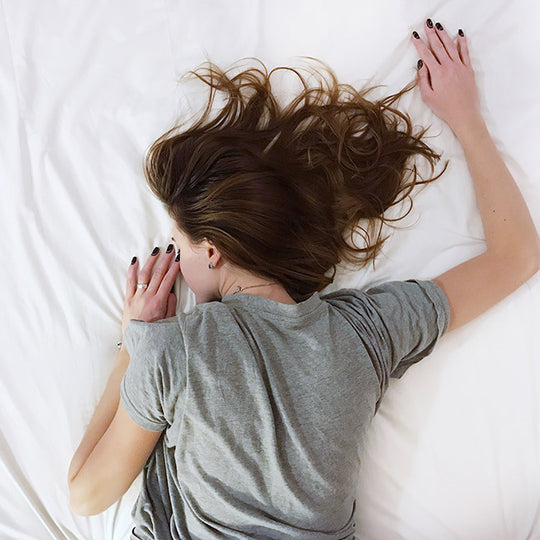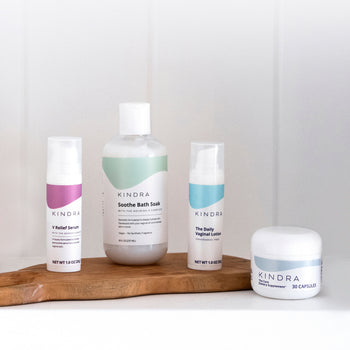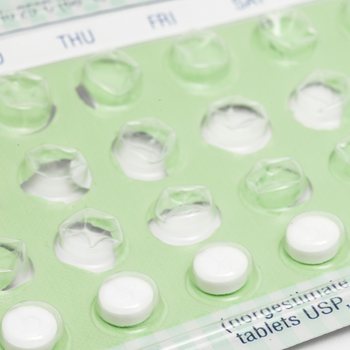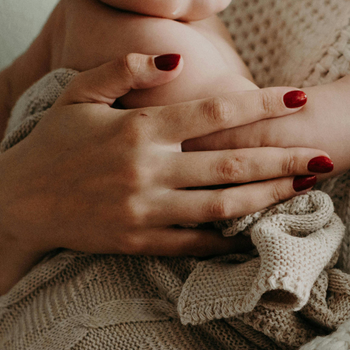At even the most casual of mentions, the word “sleep” instantaneously makes me sigh, smile, and long for the good old days when I was actually able to do it for more than 8 uninterrupted hours. Back then I rose from my sweet slumber each morning, feeling well rested and ready to take on the day. Complaints about feeling tired never ever passed my lips. It’s really true that you don’t know what you’ve got until it’s gone.
I miss sleeping well.
While many women can trace the origin of their sleep problems back to when they gave birth to their first child, those who don’t have children aren’t immune to sleep issues. We all deal with things that keep us up at night as we grow older. Managing a household, relationships, and a career isn’t always smooth sailing and our angst over all of it can come out at night to play.
Sleep is more important than most of us realize. In addition to the benefit of feeling great after a quality night of sleep, the rest of our body has much to gain from it, too. While we’re sleeping our body is healing and repairing itself. From our immune system to our heart and blood vessels to our hormones, all of our insides need good sleep to keep our physical health intact. Our brain can better prepare for the following day through sleep as well, and we are definitely more able to get along with others when we’re rested.
I have been a light sleeper for years. I have worked at jobs I loved but found incredibly stressful. I’m also a perfectionist and a thinker: my brain has a really hard time shutting down because I’m always trying to come up with solutions. At one point I was “sleeping” for approximately 4 hours each night, and those hours were interrupted by noise, an inability to find a good sleeping position, and a trip to the bathroom. To make matters worse, my husband was sleeping great which, admittedly, gave me a little bit of rage. (Sorry, sweetheart.)
Once I started exhibiting symptoms of perimenopause, my sleep cycle took another hit. I can fall asleep with no problem but staying asleep is a different story. Naturally, I’m not alone: according to the National Center for Health Statistics, “among those aged 40-59, perimenopausal women were more likely than postmenopausal and premenopausal women to sleep less than 7 hours, on average, in a 24-hour period. It was discovered in that same study that half— half! —of perimenopausal women wake up in the morning feeling tired.
What causes all of this lack of rest among middle-aged women? The changing levels of estrogen can result in sleepless nights. In addition to general insomnia, many women find themselves “blessed” by the random appearances of hot flashes, or sudden feelings of intense warmth that can greatly disrupt a woman’s life during any hour of the day or night.
The Cleveland Clinic has some great advice for those whose hot flashes are keeping them awake:
- Wear loose clothing to bed to stay cooler
- Keep the bedroom well-ventilated to prevent night sweats
- Avoid spicy foods and other foods that might cause sweating, right before bedtime.
In addition, experts recommend keeping the bedroom at a comfy 60 to 65 degrees, which I wholeheartedly endorse.
Although it may not be possible to kick insomnia to the curb entirely, there are additional things we can do to give our bodies the best chance at good sleep. For many women, those include taking nightly natural dietary supplements that can help reduce night sweats. For me, those include limiting my beverage intake in the hour or two before I turn the lights out. Making the bedroom as dark and quiet as possible, eliminating the use of screens within the hour before bed, using lavender sprays, oils, or candles, and considering buying a new pillow or mattress if it’s been a long time are just a few of the helpful hints on the National Sleep Foundation’s website.
As with the other menopause symptoms I’ve been experiencing, I tell myself that this too shall pass. Until it does, I’m stocking up on earplugs and lavender pillow spray.
NOTICE: KINDRA DOES NOT PROVIDE MEDICAL OR HEALTH CARE ADVICE. OUR EMPLOYEES AND OTHER REPRESENTATIVES ARE NOT PHYSICIANS OR HEALTH CARE CLINICIANS. YOU SHOULD CONSULT YOUR PERSONAL PHYSICIAN FOR ANY MEDICAL AND/OR OTHER HEALTH CARE ADVICE BEFORE ACTING ON ANY INFORMATION PROVIDED BY KINDRA OR ANY OTHER SOURCE.
Continue the Conversation
Leave a Reply
Tags: About Menopause Anxious body Fatigue Hot flashes insomnia Mental Well-Being Night Sweats personal stories Physical Well-Being Stressed trouble sleeping













Melissa, great minds think alike! I too use earplugs and lavender pillow spray. I also wear a sleep mask to bed to block out light. All of this generally work like a charm. It’s the dreaded hot flashes that are usually the culprit when I can’t sleep.
— Valerie Albarda
Thanks for commenting, Valerie! (and sleep well tonight! ;) )
— Melisa Wells